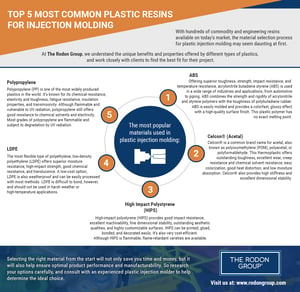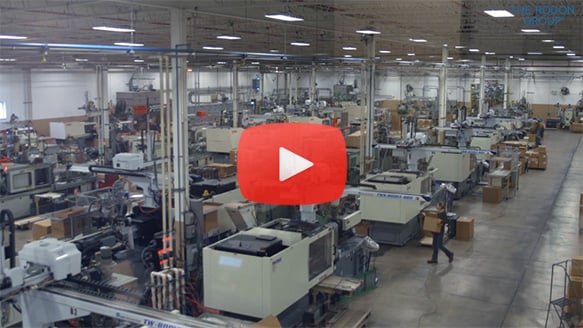Capabilities
There are multiple plastic resin material options to choose from for use in the plastic injection molding process. Each material has its own unique properties; therefore, understanding the differences between them is crucial to ensure selecting the most suitable most material for your intended application.
Common Materials
 The top 5 most common plastic resins used in the injection molding process include:
The top 5 most common plastic resins used in the injection molding process include:
- Polypropylene. This rigid material has insulation properties and provides resistance to chemicals and fatigue; however, it is flammable and vulnerable to UV radiation.
- Low-Density Polyethylene (LDPE). LDPE is a cost-effective, easy to process, flexible, and high strength material that offers translucence and resistance to chemicals and moisture.
- Celcon® (Acetal). Acetal, otherwise known as polyoxymethylene (POM) or polyacetal, is a thermoplastic that offers wear resistance, toughness, creep and chemical solvent resistance, low moisture absorption, heat distortion, and easy colorization.
- Acrylonitrile Butadiene Styrene (ABS). ABS offers high strength, toughness, and resistance to impact and temperature. It is easily molded and gives a high-quality glossy surface finish. This plastic polymer does not have a specific melting point.
- High Impact Polystyrene (HIPS). This cost-efficient material offers excellent machinability, dimensional stability, impact resistance, and aesthetic properties. It is highly customizable and can be glued, printed, bonded, and decorated with ease.
Material Applications
Each of the resins mentioned above offer key material properties, making them suitable for a variety of applications, including:
- Medical/Pharmaceutical. Plastic resins are used in plastic injection molding processes to produce high precision components, laboratory supplies, housing parts, surgical equipment, and more. Plastic polymers are used as additives to improve characteristics such as strength and resistance to chemicals and impact.
- Window/Door. Strong plastic materials are used to produce high-quality door and window parts, including locks, joiners, latches, vent stops, and more.
- Food & Beverage.Since this industry is heavily regulated, food-grade plastics are used in the injection molding process to produce safe items such as containers, bottles, caps, and more.
- Construction. Plastic resins are regularly used in the manufacturing of construction components and building products and assemblies.
Considerations for Selecting the Right Material
It is important to consider the following factors to ensure selecting the ideal material for your application:
- Part End-Use/Application. What is the finished product going to be used for, and what sort of environmental conditions does it need to be able to withstand?
- Appearance. What sort of finish or color do you want or need the final product to have?
- Regulations and Standards. Will the finished product be used in an industry where compliance with particular regulations is required?
- Thermoset vs. Thermoplastic. Do you want a material that is easily recycled or set in a permanent form?
Plastic Over Metal
Plastics have several benefits when compared to metal. Plastic resins offer higher tensile strength, reduced weight, durability, lower manufacturing costs, decreased material waste, and more flexibility. Using plastic in injection molding processes produces large volumes of highly precise parts with increased repeatability.
The Rodon Group for Your Plastic Material Needs
At The Rodon Group, we specialize in plastic injection molding using strong plastic materials. We understand our customers' needs and offer appropriate solutions and guidance in choosing the best materials for your applications.. Read our Top 5 Common Resins blog to learn more about plastic injection materials or, for help choosing the right material for your needs, check out our How to Choose the Best Resin Material blog today.










